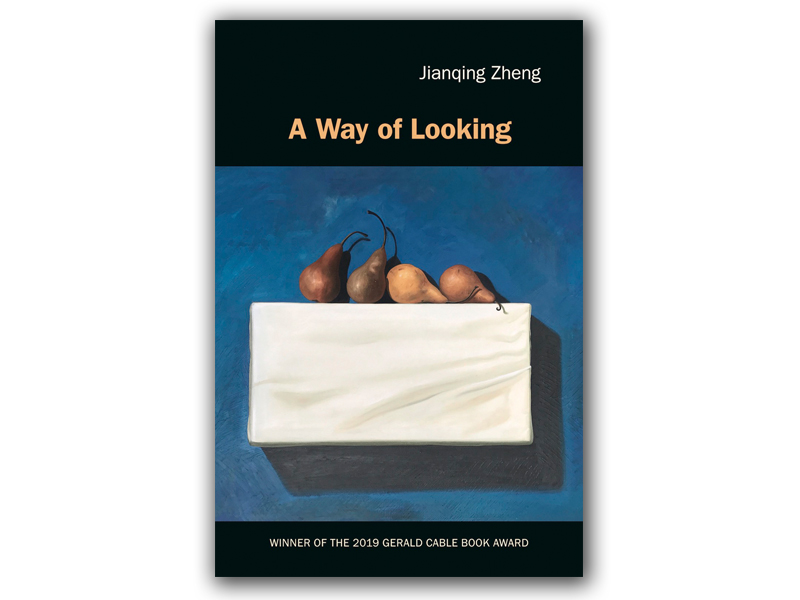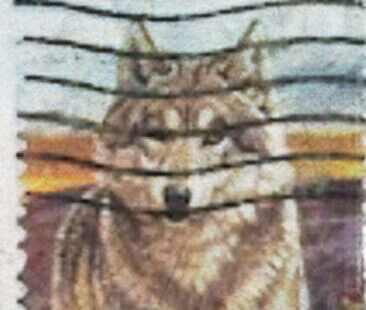
Book Review: A Way of Looking
By Jianqing Zheng
Published by Silverfish Review Press
Eugene, Oregon
2021, Paperback, 77 pp.
ISBN: 978-1-878851-7-27
$18.00
Ordering Information
Reviewed by Rich Youmans
Jianqing (John) Zheng’s writing conveys an outlook shaped by two cultures. Born in Wuhan, China, Zheng came of age during Mao Zedong’s Cultural Revolution, and in the 1970s he became one of the millions of zhiqing (“educated youth”) who, as part of Mao’s “Down to the Countryside Movement,” were sent to communal camps to be re-educated by farmers. Zheng based a previous chapbook, Enforced Rustication in the Chinese Cultural Revolution, on this period in his life (“We learned to plow the cotton fields, plant rice seedlings with fingers, and reap the crops. At night, our life was as flat as our farm work…”). Ultimately, with help from two of his college English professors, Zheng emigrated to the United States and earned a graduate degree. Today he is a professor of English at Mississippi Valley State University, and traces of his new home—the horns of barges and riverboats along the Mississippi, pecan trees in bloom, the rhythms of jazz and the Delta blues—can be found throughout his work.

In A Way of Looking, Zheng roams between these two influences. Winner of Silverfish Review Press’s 2019 Gerald Cable Book Award, the collection contains 51 poems (mostly haibun along with a few tanka prose pieces) that range from sketches of the poet’s family and workplace to narratives that read like folk tales. Zheng uses language that’s direct and understated, with a quiet depth. At its best, his writing offers just enough details to draw in the reader as effortlessly as a river’s flow, with the haiku or tanka creating subtle connections. Throughout the book, Zheng presents a way of looking at life that ultimately traverses cultures—even those as far apart as Communist China and the Mississippi Delta—and explores the idea and meaning of “home.”
The book is divided into four sections, each of which develops its own theme. The first section, “On the Road,” contains a dozen poems that take the reader on some of Zheng’s trips and family excursions, primarily throughout the South—from the Mississippi Delta to Arkansas, New Orleans, and the Tennessee Smokies. In a way, the poems offer paeans to the poet’s adopted region. Take this passage from “The River Park in Helena, Arkansas”:
The incessant flow of the river is like a silent piece of blues. Sometimes the slow tooting of a barge sounds like a soft southern drawl; sometimes the drifting willow catkins add a sense of motion to the still riverscape. Nightfall. The sky unfolds some sparse stars. The casino neon lights start to shine on the other side of the river. At this moment it’s always good to lean on the railing and debouch your mind to go with the flow to a world of otherness.
moonrise:
at the sky’s edge
a lone sail
Zheng is also a photographer, and in several of the pieces he refers to “taking shots”—of moss-covered gravestones, or of the road signs and murals associated with some of the region’s great bluesmen. (Zheng’s fondness for jazz and the blues is evident throughout.) His eye for framing pictures and capturing detail can be seen in his haiku and tanka, as shown in this except from “Weekend Drive, 1998”:
After landing a university job in the Mississippi Delta, I fell in love with photographing blues sites for my research. One Saturday I went to grab shots in Moorhead, where W.C. Handy’s “Yellow Dog Blues” immortalized the crossing of the Southern and the Yazoo Delta railroads.
juke joint blues
a sluggish creek crooks
through town
by a lean-to shack
blooming wisteria
His references to photography “shots” hearkens back to the book’s title and emphasizes the importance of seeing often-missed details—or, perhaps, of just seeing what’s important. A good example of this can be found in “Katrina Notes on New Orleans.” After describing Hurricane Katrina’s devastation of the city’s poorest neighborhoods (“the mobile homes and small wooden houses float like life preservers”), Zheng moves on to portray the skewed and often self-absorbed responses from his university community. It ends with the following passage:
Professor Wright, who also lives in the lake area of the Crescent City, emails me his anger about the flood that has damaged his house. His anger grows even stronger than the power of Katrina when he realizes he has lost all of his manuscripts—his blood and energy—for good to the flood, especially the ones on a jazz poet living in Chicago.
after Katrina
pulling mother’s chair
from the debris
The “On the Road” section ends with a haibun about a man (presumably Zheng) who returns to his hometown in China and “gets lost one way or the other because the roads are no longer the dirt ones” of his memory. Titled “Homecoming,” the piece emphasizes the transitory nature of “home,” especially as the poet passes scenes on Canton’s Pearl River that could have been set on the Mississippi (“a barge…chugs along and looms out into the white sun rising over the river’s bend and its horn faints away like a dirge”). It also leads nicely into the book’s second section, “Farewell.”
China plays a dominant role throughout this section. Some convey Zheng’s earliest memories in a boarding kindergarten, a period of intense loneliness (“ghost buildings / night after night of / dead silence”), while others are reminiscent of ancient Chinese folk tales or parables. All consistently touch on some type of separation, whether through geographic distance, disparate points of view, or death. Even when the poems move to episodes in the United States, memories of China still intrude, whether spurred by news of an old friend’s passing or by a book chapter, as in this haibun:
Wandering Mind
I open Pearl Buck’s My Several Worlds randomly to page 190 and a calm Chinese landscape from her life unfolds itself before my eyes: It’s in gentle blues and greens with radiant sunshine, “lovely in its way with delicate swaying bamboos, curved temple roofs mirrored in lotus pools.” What she paints becomes a picture I once saw outside the East-West Center in Oahu.
night wind
a call and response
of two cats
That East-West connection (and the haiku’s clever dramatization of two cultures resonating) hint at the dual cultures that reside within the poet. As the section’s title suggests, these poems could be read as the Zheng’s reckoning with a life that’s in the past but still resonates. The final piece in the section, “The Help,” dramatizes this dichotomy. The haibun describes how Zhinu, the wife of a retired Beijing psychology professor, goes to the United States to help raise a grandchild, leaving her husband alone in China.
Zhinu chimes in her usual soft voice that she feels happy to offer her hand. If he misses her, he should fly over to help her. They keep chatting—about their life divided by the grandbaby, their declining health and their planned travel after retirement. When the baby starts to mewl in the cradle, Zhinu says Take care and hangs up.
separate…
still under
the same moon
By the third section, “Momentary Stay,” the overarching theme is no longer just geographical. While the haibun and tanka prose in this section do offer glimpses of the Delta region and touch on scenes presumably drawn from Zheng’s life, as a whole they pull back to focus on a larger theme: the ephemerality of existence. A sense of melancholy and even foreboding carries through the section’s 13 pieces. The topics include the predator-prey relationships in nature, a near collision with an 18-wheeler, and, in “Territorial Claim,” the overall decay and rawness of a small town where any such “territorial claims” are indeed momentary:
A black bulldog trots to a trashcan in the back alley and lifts its right hind leg to pee. An almost invisible steam drifts a second in the slanting sunlight. A German shepherd and a Golden Retriever bark loudly behind my neighbor’s wire fence. The bulldog, unconcerned, trots on.
ghost town churchyard—
headstones looming
in high weeds
overhead
crows circling
Several of the haibun seemingly draw on Zheng’s university life, which comes across as bland, monotonous, and almost dehumanizing. The section’s title haibun exudes dolor as the speaker—a university professor who has just finished typing a required report and has a migraine clinging “like a leech”—has to remind himself to “Get up and go home.” That sense of dislocation and lost time reappears in “Departures”:
Home on leave to write a grant proposal, I slide windows open to invite birdsongs and sunshine in. Cool air flows through, confirming that summer has silently walked away.
mind wandering
the train chugs louder
and louder
That chugging train appears several times throughout this section—a metaphor, perhaps, for the relentless passage of life to its final destination. In the book’s fourth section, Zheng offers a more positive take on the train’s path: “Toward Forever.” If the middle sections of this collection emphasize separation in one form or another, this final section focuses on connection: through love, through family, and especially through memory—one of the ultimate ways in which a life can be sustained past death.
Among those lives that Zheng sustains are those of his grandmother—a comforting presence during his years at the boarding school—and of his two English professors, Dr. Don George and his wife, Nell, the couple who first brought Zheng to the United States (specifically, to Hattiesburg, Mississippi). In “Last Words,” he presents a list of “Mama Nell’s” occupations and passions, as told by the pastor at her funeral: butcher in a slaughterhouse, singer with Louis Armstrong’s band, world traveler, master gardener, and inveterate stamp collector. Through the parade of details, a portrait of Nell emerges, and the haiku adds a final poignant moment:
funeral procession
the pall sways too
with the jazz band
“Eulogy” is for Don George, and it again touches upon the idea of home and origin.
Dr. Don George was my professor in China in the late 1970s; he was also my rebirth father because he brought me to this beautiful country and gave me a new life in this small city of Hattiesburg.
summer visit—
in the town where
I was born
I’m asked
where I’m from
In a 2016 interview in the literary journal Poetry South, Zheng answered a question about his experience “as a transplant from China to the Delta” by quoting from one of his own poems: “Home is where one lives with memories.” By the end of A Way of Looking, the memories plumbed throughout this book are firmly rooted in the Mississippi Delta, and in the people who influenced the poet’s life and helped his “rebirth.” The final haibun in the book takes this idea of rebirth one step further:
Waiting for Spring
When life stops clicking, body—a mass of elements—can be turned to ashes, used as fertilizer for flowerbeds.
autumn dusk
a worn-out jacket
on the peg
We’re not sure to whom the jacket belongs—a deceased friend or relative? the poet himself, its wear signifying his own advancing age? Perhaps the jacket belongs to a loved one now gone, but the poet continues to wear it as tribute (perhaps even while working on those flowerbeds). Regardless, it potently conveys how just as one’s body lives on and nourishes the soil, so too does one’s spirit live on in others’ memories and nourishes that thing called “home.” It’s a fitting end to a collection that deserves a home on the bookshelf of anyone interested in contemporary haibun and tanka prose.
Note: “Interview with Jianqing Zheng” appeared in the 2016 issue of Poetry South, a national journal published annually by Mississippi University for Women. the journals archives can be found at https://www.muw.edu/poetrysouth/archive.
About the Reviewer

Rich Youmans lives on Cape Cod with his wife, Alice. His books include Shadow Lines (Katsura Press, 2000), a collection of linked haibun with Margaret Chula, and Head-On (Red Bird Chapbooks, 2018).
